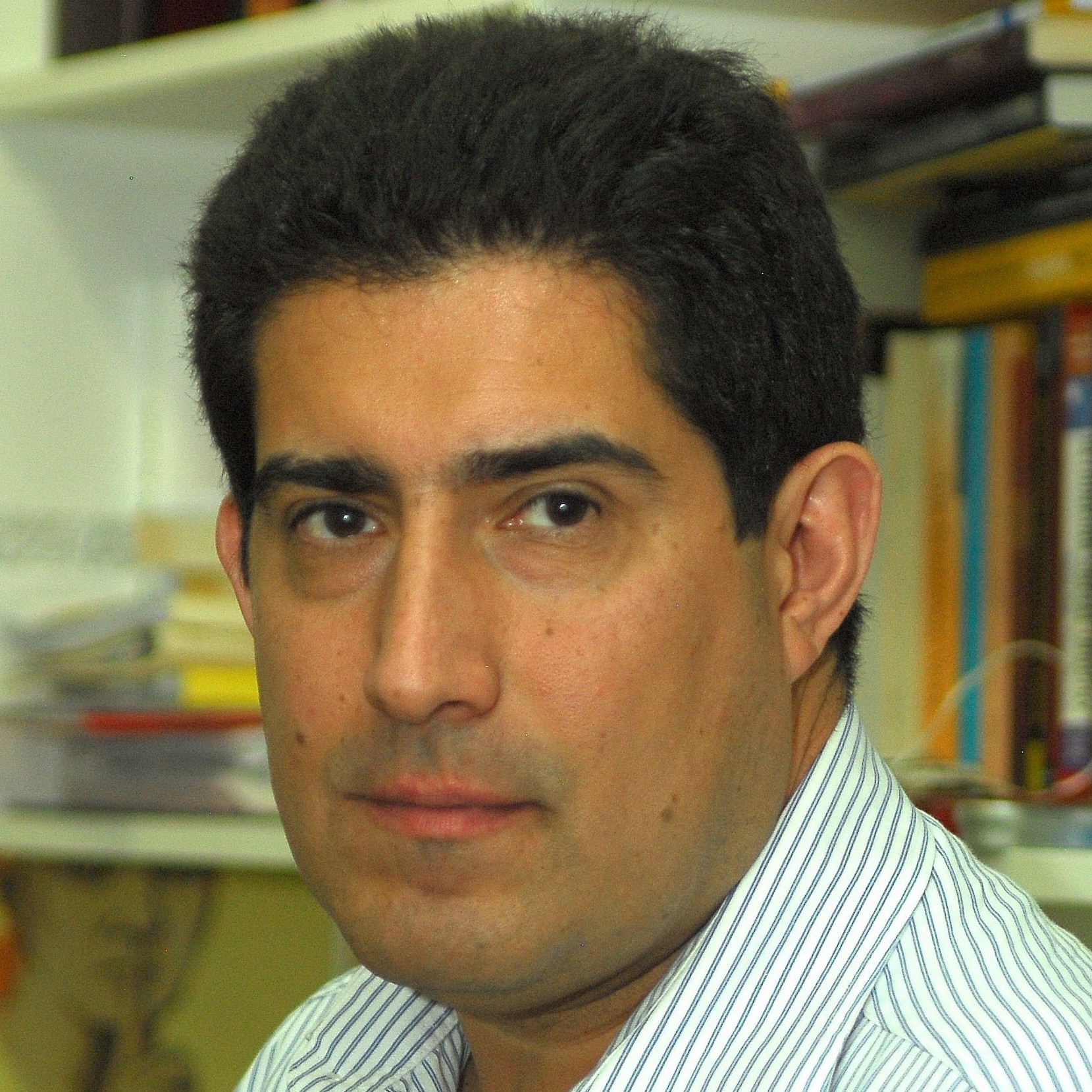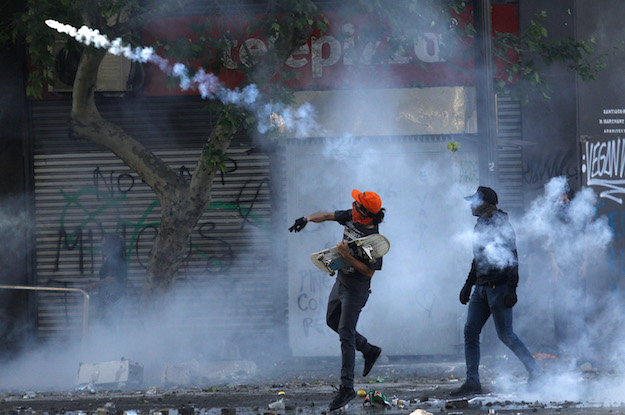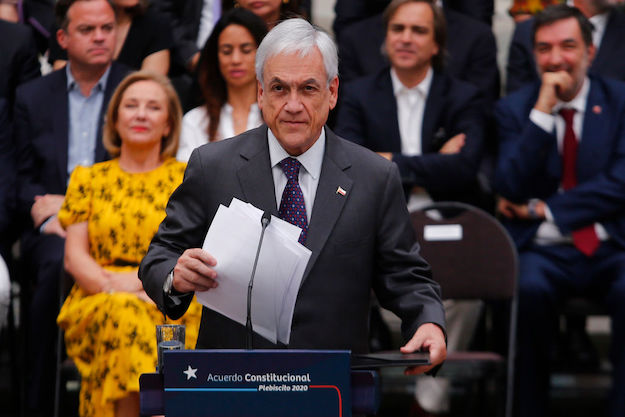SANTIAGO – As the most developed economy and most stable democracy in Latin America, Chile was the last country observers would have expected to see riots and looting. For that reason, the riots that destroyed Santiago’s subway, wreaked havoc and paralyzed Chile starting Friday were so surprising — even for Chileans.
As analysts rush to explain the cause of the outburst of discontent, the explanations for Chile’s weekend of rage will have important consequences for our understanding of what is happening in Latin America now that the commodity boom is over and the Latin American electorate is in a strong anti-incumbent mood. While some will see a popular rejection of the market-friendly economic model in place in Chile for the past 30 years, others — including the right-wing government of President Sebastián Piñera — will point to an international conspiracy to test the strength of Chile’s democratic institutions.
In fact, many of those protesting do oppose the neoliberal economic policies championed by both left-wing and right-wing governments in Chile over the past 30 years, and there might be activists committed to derailing the most stable moderate right-wing government in the region. But the real reasons behind the rage lie in the frustration of a population that was promised access to the promised land of middle-class status, but that has been denied such access at the gate due to an unlevel playing field characterized by an abusive elite, an unresponsive government and an unkept promise of meritocracy and equal opportunity.
The bad news is that people are upset, disappointed and angry. The good news is that Chile is in a good position to adopt inclusive reforms that promote social justice, defend markets (rather than business or special interests) and level the playing field. The riots have been a much-needed wakeup call for the ruling and political elites to open the gates to the promised land. If the elites fail to live up to the occasion, Chile will fail to become the first Latin American country to graduate to a high-income level. If the Chilean elites relinquish many of their privileges and accept that meritocracy means that while some move up others move down, Chile will have shown the way for other Latin American countries to make the transition from middle-income to high-income status.
The riots surprise (nearly) everyone
As has happened so many times elsewhere in Latin America, the 2019 riots in Chile began after a government-mandated increase in public transportation fees. Yet, the similarities end there. The 3.75% tariff increase is only marginally higher than inflation. Minimum wage earners do pay about 20% of their salaries in transportation, but that cost has been going down in recent years. Besides, the fare increase was determined by an autonomous technical board, not by an International Monetary Fund-imposed austerity package. The Chilean economy will expand by close to 3% in 2019. Inflation is low and unemployment has been steady, despite the influx of close to 1 million immigrants (in a country of 17 million people) in recent years.
The riots began early last week when college students began calling for fare dodging in Santiago’s subway system—Latin America’s most modern. In a country where students have triggered massive demonstrations in the past—most recently in 2006 and 2011—the student movement caught on rather rapidly during the week. By Friday, the fare-dodging mob rallies were quickly spreading on social media and disrupting the normal functioning of the subway system.
The right-wing government of Sebastián Piñera (now in his second non-consecutive term, running until 2022) was slow to respond. When the fare increase was first announced, a government minister explained it away suggesting that people get up earlier to take advantage of the lower fare cost before 7 am. The transportation minister, who had gained notoriety for her sophisticated wardrobe, showed little sympathy for subway users and, when the fare dodging movement first began, the government’s spokesperson denounced them as misdemeanor offenders.
By Friday, the fare dodging movement had grown so strong that the subway system shut down the entire operations before the afternoon rush hour. Millions were caught for hours in traffic jams and many others chose to walk home. During my 5-mile walk home, I saw perhaps hundreds of immigrants – many of them Venezuelans, given away by their easily recognizable accents. My thoughts drifted to the so-called “Caracazo” — the protest movement that paralyzed Venezuela in 1989, after the government introduced a fare hike as a part of an IMF package – and whether history might be improbably repeating itself here.
That night, as riots and looting were taking place throughout Santiago, a visibly shaken President Piñera — who had returned to the presidential palace after being photographed in an-upper class restaurant celebrating one of his grandsons’ birthdays — announced a state of emergency, the first such occurrence in the capital not associated to an earthquake or a flood since the return of democracy in 1990. As the riots continued throughout Saturday, the government declared a curfew for Saturday night. The military patrolling the streets did not dissuade all people, and looting and riots continued through Sunday. In a country with a history of brutal military rule, the Chilean armed forces did not make full use of its abilities to try to end the looting.
Piñera’s insufficient response
President Piñera had previously endured protests in his first term (2010-2014), when students almost paralyzed the country demanding free access to higher education in 2011. As one of Chile’s wealthiest men, Piñera struggled with low approval in his first administration.
Though there was healthy economic growth, Piñera’s people skills were often not up to the occasion. He would regularly crack inappropriate jokes (Once, he asked what is the difference between a man and a politician? I won’t repeat his punchline, but you can guess there is no way such a joke can end well). Chileans believed that Piñera cared more about the elites than about them. Yet, after Piñera’s successor (and predecessor), the leftwing former President Michelle Bachelet (2006-2010 and 2014-2018) completed her second term, Chileans were ready to give the moderate businessman a second chance. Since Bachelet had attempted sweeping state-centered reforms that slowed the economy and increased unemployment, Chileans were ready to vote for a candidate who would put the focus back on the private sector as the engine of economic growth. Piñera’s 2017 presidential campaign message was simple and blunt: “The good times are coming.”
Chile — as most other Latin American countries — is highly dependent on commodity exports. When the price of copper falls, the Chilean economy suffers. As a non-oil producing country, Chile is also dependent on international oil prices. A fiercely open economy, Chile is highly vulnerable to trade wars among large nations. President Piñera — who publicly stated that he preferred Hillary Clinton to win in 2016 — has strongly criticized Donald Trump’s trade war with China. So, while the Chilean economy has continued to grow despite the headwinds of the international economy, Piñera’s promise of good economic times has failed to materialize.
The end of the neoliberal economic model – or an international conspiracy?
Starting in the late 1990s, when Chile was completing its first decade of democratic rule, many intellectuals began to criticize the market-friendly economic model put in place by the Pinochet dictatorship (1973-1990). Pointing to the absence of a state that could guarantee social services and a safety net, those people criticized the overly individualistic basis of the market-friendly economic model. Chileans were treated more like consumers than citizens. Though the center-left Concertación/Nueva Mayoría coalition (in power between 1990 and 2010 and 2014-2018) introduced many state-centered reforms and changed the constitution to eliminate authoritarian enclaves left in place by Pinochet before he left office, Chile still retains key features of an extreme market-friendly economic model.
Yet, Pinochet is to most Chileans today what Darth Vader was to Luke Skywalker. It is a force to be reckoned with, but it is more part of the past than the future. Chile was able to build a well-functioning democracy despite the authoritarian straitjacket legacy. Since 1990, poverty rates have declined from about 40% to less than 10%. The middle class is bigger than ever before in the country’s history. Inequality remains high, but it is the lowest on record. In late 2017, Chileans voted for the second time in less than a decade for a right-wing candidate for president. Thus, the claim that Chileans are discontent with the economic model and want a radical change is just not consistent with the facts. Chileans are better off today than at any time before in their history. Unlike Trump’s “Make America Great Again,” Chileans do not have a mythical past to look back to with nostalgia.
Though satisfaction with democracy has fallen in recent years — as elsewhere in Latin America — Chileans still value it more than any other form of government. When asked about what countries they want Chile to look up to, people often mention northern European countries. There is little admiration in Chile for Fidel Castro’s Cuba, Nicolás Maduro’s Venezuela, Mauricio Macri’s Argentina or Jair Bolsonaro’s Brazil.
Over the past 30 years, Chileans know the country has made much progress, there is growing wealth and living conditions have improved. But most Chileans are also very much aware that consumer rights are weak, they suffer from widespread abuse by oligopolies in several industries, access to quality education is expanding very slowly, and access to quality healthcare remains largely unequal. Chileans have seen the promised land, but they have not been let in. Just as a frustrated passenger consumed by rage is willing to tear apart the waiting room at an airport, many Chileans had a weekend of rage demanding that they be finally let through the gates.
Many protesters talked about the accumulated discontent with Chile’s economic model. “It is not the 30 pesos (US$4 cents) of the subway fare increase, but 30 years of abuse,” was a common phrase. Yet, the polls show that Chileans want a combination of better public services and more competitive markets rather than a full abandonment of the market-friendly system.
By Sunday night, the government, criticized for its slow response and wavering decision to decree a state of emergency and, at the same time, refrain from letting the military take full command of the streets to stop looting, chose to respond with an untimely and unwise counterattack. President Piñera claimed that Chile was “at war with a powerful enemy that respects nothing.” Though he did not specify the enemy, one could read between the lines and see the government trying to blame Venezuela’s Maduro regime. Since Piñera has been an outspoken critic of the authoritarian government of Venezuela, there are good reasons why Venezuela would want Chileans to revolt against Piñera.
The way in which the looting — especially the destruction of subway stations in Santiago — took place has raised suspicions about the ‘spontaneity’ of the protests. Seeking to regain ground, the government will now try to blame political enemies — including the far left in Chile, which has thrown its support behind the peaceful protests while not-so-strongly condemning the violent ones — rather than hearing the underlining message of the discontent.
Open the gates of the promised land
Yes, it’s clear: The riots are neither an indication that Chileans are fed up with the economic model in place since the restoration of democracy, nor evidence of an international left-wing conspiracy to destabilize a democratic, moderate right-wing government. The Piñera administration is clearly at fault in the way it has responded to the crisis. But there is a deeper message that runs through the student fare dodging movement and even the looting of supermarkets — which has seen people running away with televisions, refrigerators and washing machines.
After the government decreed its state of emergency, older Chileans have brought back memories of the years under military rule in the 1980s. Yet, during that era, the demand was clear and simple: Pinochet out, democracy in. Today the demand is far more diffuse. Piñera is clearly unpopular, but he is a legitimate president and his tenure has been free from major scandals. He is not personable and does not seem to care much for (or understand) what Chileans fear, want or believe. Just as the discontent did not end when the government backtracked on the subway fare increase on Saturday, a Piñera resignation would not solve the underlying cause of the riots.
When I took my first Latin American politics class thirty years ago, I learned that, having remained immune to the authoritarian wave that swept the region in the 1970s and 1980s, thirty years ago, Venezuela was the most developed and stable democracy in Latin America. But the country had three problems: high dependence on a single commodity (oil), high levels of inequality and an increasingly corrupt and unresponsive elitist political system. Other than that, Venezuela was the most successful Latin American democracy.
Today, as a professor, I teach my students that Chile is the most successful Latin American democracy, but the country has three problems: high dependence on copper, high levels of inequality and an increasingly unresponsive and corrupt political system.
Fortunately, today Chile is a much better shape than Venezuela 30 years ago. Chile is less unequal than any time before. The economy is more diversified than ever, and the ruling political elite is far less corrupt and far more responsive than Venezuela’s old establishment. Yet, the Chilean elites are not willing to open the gates of the promised land to the emerging middle class. The Chilean elites would benefit from learning the lessons from the devastating experience of Venezuela since the early 1990s. Unless the benefits of economic growth — the promised land — are more justly distributed, the promised land will turn into hell for everyone.
Time is running short for the Chilean elite to act. Auspiciously, the ruling elite seems to have heard the message loud and clear. If Chile finds a way to open the gates, the 2019 riots will not prove to be a new “Caracazo” underlining the failure of Latin American countries to overcome their legacy of instability and frustration stemming from the region’s stubborn levels of high inequality.
—
Navia is a professor of liberal studies at NYU and professor of political science at Diego Portales University in Chile








